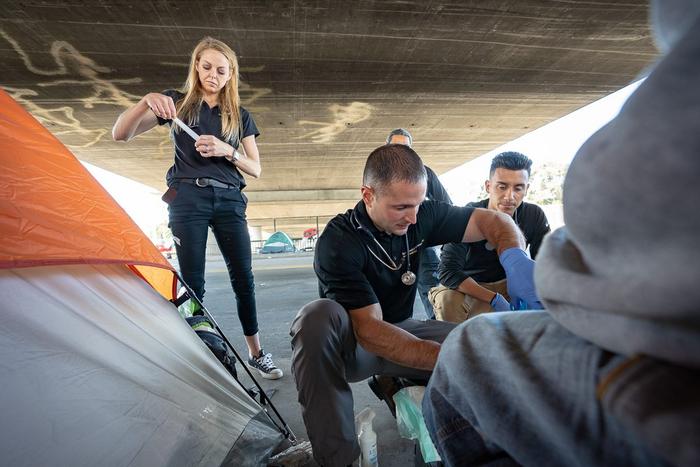Mental health and substance use disorders are prevalent among people experiencing homelessness, yet access to care for these health issues is challenging for people living on the streets. Now, a new survey conducted by a team of researchers from USC Street Medicine found that, in California, street medicine programs are helping to fill this gap, delivering critical, high-level mental health and substance use treatments to the state’s unsheltered population.

Credit: Chris Shinn
Mental health and substance use disorders are prevalent among people experiencing homelessness, yet access to care for these health issues is challenging for people living on the streets. Now, a new survey conducted by a team of researchers from USC Street Medicine found that, in California, street medicine programs are helping to fill this gap, delivering critical, high-level mental health and substance use treatments to the state’s unsheltered population.
The survey, published in Community Mental Health Journal, shows that street medicine has the potential to serve as the basis for a strategy to expand access to behavioral health care for people who are unhoused.
“This survey showed that there is tremendous need for mental health and substance use services and that street medicine programs are providing more services and higher-level care out of necessity,” said Brett Feldman, director and co-founder of USC Street Medicine, assistant professor of family medicine at Keck School of Medicine of USC, and one of the authors of the study. “We found that street medicine teams have trained up to provide a higher level of behavioral health care because there’s little access to psychiatric care, especially on the street.”
The authors noted that addressing the mental health and substance use problems, common among the state’s homeless population, is one key to improving communities’ efforts to address homelessness.
Need is great, resources are sparse
The researchers from the Keck School of Medicine surveyed 29 street medicine teams in California, 26 of which completed the survey. One was excluded because it is too new a program to have meaningful data. Street medicine organizations reported that 64% of their patients have mental health problems and 67% have substance use disorders. All but one of the street medicine programs provides some mental health and treatment for substance use disorders.
Despite the need, most of the street medicine programs reported having difficulty successfully referring their patients to mental health and addiction treatment programs. Referring unhoused patients to specialists is often difficult, noted Feldman, since many have no address, phone number or transportation to make visits to specialists.
Eight of the street medicine programs surveyed include a psychiatrist, but only two of them are full-time. Six of the teams have part-time psychiatrists who provide between four to 10 hours a week of care. Feldman added that there is a national shortage of psychiatrists, which has made it increasingly difficult for disadvantaged people, such as people living on the streets, to access psychiatric services.
Street medicine programs are typically staffed with primary care providers who are trained to treat some mental health issues, but people with complex or severe mental health problems often need the type of care that only a psychiatrist can provide.
Addressing the problem of access
The study concludes that street medicine is a promising approach to improving access to mental health and substance use care for people who are unsheltered. Feldman said 60% of the state’s programs provide very high-level care, such as medication-assisted therapy, which involves treating substance use disorders with medications, such as suboxone, in combination with counseling and behavioral therapy.
Street medicine providers have also embraced using long-acting antipsychotics for people with severe mental illness. These drugs last up to about a month, which makes adherence simpler for people living on the street and stabilizes them for longer periods of time than daily oral medications.
The study’s authors also suggest novel approaches to providing behavioral health services should be explored, such as using telehealth during street visits to provide patients with access to psychiatric care or treatment for addiction. They also assert that additional research should be done to understand the barriers that exist to providing medications to treat psychiatric problems and substance use disorders and find new ways to improve access. Finally, the authors conclude that the all of the strategies for providing behavioral health care through street medicine should be further studied and evaluated to allow for the development of evidence-based practices that can be tested, replicated, reimbursed and operationalized.
About this study
Additional authors of this study include Kimberly Y. Su, Corinne T. Feldman, Sonali Saluja, Alexis M. Coulourides Kogan and Michael R. Cousineau of the Keck School of Medicine of USC.
Journal
Community Mental Health Journal
DOI
10.1007/s10597-023-01169-z
Method of Research
Survey
Subject of Research
People
Article Title
Behavioral Health Care Delivery Through Street Medicine Programs in California
Article Publication Date
1-Aug-2023




